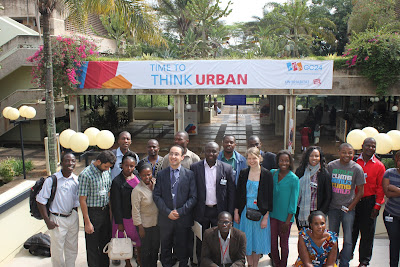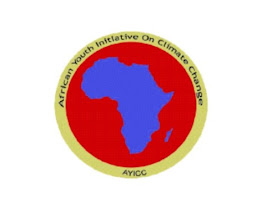The Quest For Sustainable Cities; The UN-HABITAT 24th Governing Council
 |
| Some of the delegates at the conference |
The 24th United Nation Human Settlements Programme UNHABITATGC24
was held in the United Nation Office in Nairobi UNON- Kenya from the
15th to the 19th April 2013 under the theme of Sustainable Urban Development:
The Role of Cities In Creating Improved Economic Opportunities For All,
With Special Reference To Youth and Gender. The governing council
was a biennial meeting attended by members of the United Nations, the
United Nations organizations including specific agencies, the Habitat
agenda partners, intergovernmental organizations, Local authorities,
and non-governmental organizations; a total of 1144 delegates from 107
countries attended the meeting. The UNHABITAT director Joan Clos and
the Kenyan President Uhuru Kenyatta opened the meeting creating a lot
of forwardness looking in the coming days of the meeting. The meeting
began on a high note recognizing the young people and women that is
the UHNABITAT Youth Unit and women unit for taking part in the Governing
Council.
The Conference started on a high note highlighting the need to create
Sustainable cities since the world is moving toward urban life and there
was need to improve cities lives, Cities are becoming interdependent
and similar in away because of networking and there was need to encourage
Local Authorities, national governments regional and international bodies
to create more networking opportunities. The meeting also Highlighted
inclusivity and diversifying leadership for a sustainable future. It
was noticed that migration to cities still creates gettorization, women
and youth being the majority victims. Women and youth are the majority
population and if they are neglected this causes Urban crisis a good
example brought by the Somali delegate deputy Major of Mogadishu, Iman
Nur Icar “The word Shaabab means youth and if they are neglected they
organize themselves and carry out bandit business” his calls out for
inclusion of youth and women in building the future cities we want;
they are not only leaders of tomorrow but they lead now in building
a sustainable future. Women and young people are also policy implementers
and the need to include them in policy making will stop distance decay
between the Policy conductors and implementers. For effective planning
there should be a harmonious relation btw the two parties which are
implementers and formulators. The meeting also highlighted the need
to enhance diversity and inclusion at local, national, regional and
global level including harmonizing the relationship between civil societies
and governments; this relation will help in bringing comprehensive development.
The need for networking with different entities creates an opportunity
for diversifying leadership and inclusivity.
Economic issues came on the table and academics highlighted that majority
of women in the Global south still cannot access capital this makes
it had for women to reflect in the world’s economy. Land is very crucial
issues as public land still have a question. There is need for legal
land policies which will sustain public land financial mechanism. Urbanization
resolution will only be achieved if societies come from tilling the
land to levying land.
The United Nations, for statistical purposes, defines “youth,”
as those persons between the ages of 15 and 24 years, approximately
one billion youth live in the world today. This means that one person
in five is between the age of 15 and 24 years, or 18% of the world’s
populations are "youth", and children (5-14 years) comprise
of 19.8%, by the year 2025 the population of rural-urban migration will
increase and majority will be women and youth; this calls for their
inclusion in decision making. The majority (almost 85%) of the world’s
youth live in developing countries, with approximately 60 percent in
Asia alone. A remaining 23 percent live in the developing regions of
Africa, and Latin America and the Caribbean. By 2025, the number of
youth living in developing countries will grow to 89.5%. Therefore,
it is necessary to take youth issues into considerations in the development
agenda and policies of each country. There are efforts already made
in building sustainable cities and yet extra miles effort is still are
still needed. The United Nation system has made tireless efforts to
include young people in decision making since 1948 the Universal declaration
for human rights.
Democracy is the best form of governance when it comes to youth engagement
in the decision making. Open systems will create an environment for
young people to take part in leadership. Today we have the youth structure
at the united nation tabling the youth agenda. During the UNHABITAT
24th governing council the UNHABITAT youth unit Youth Advisory
Board YAB, comprising of representatives of all regions across the world
organized youth forums and also participating at the high level meeting
rubbing shoulders with policy makers to influence decisions. Emphases
were made on the use of Information Communication and Technology ICT
as a tool to create change. Through ICT a network of young people can
be used to handle both common and different challenges facing the young
population across the globe. YAB emphasized on the use of ICT as a means
of communication and engagement in the quest for positive change. ICT
has made the world a global village this helps the world population
to communicate across the globe and it is sustainable as compared to
physical meetings
The GC24 conference recognized the Government of Brazil’s hosting
of the High Level Panel on Youth at Rio +20 through which the final
declaration supports the ongoing work on UN-Habitat and the Youth 21
initiative in developing processes to better engage youth within the
UN system. The Norwegian government has supported the Young people and
adults share joint responsibility on the advisory board to The UN-HABITAT Opportunities Fund for Urban Youth-led Development established in 2009 including the YOUTH21 which was
launched in Oslo in 2011. The federal Government of Nigeria
and Ondo State in Nigeria contributed USD 5 million to United
Nation human settlement Programme; the USD 2 million from Ondo State
government will be used to help different programmes including
youth empowerment, slum grading local economic enterprises and land
reforms. Nigeria has also taken the lead in Africa in tabling youth
policy at the national level; this is a legal framework to bring the
youth in decision making table. A lot of private sector also shown interest
in supporting the initiative this includes the Chandaria industries
in Kenya, Baden Aniline and Soda Factory, BSF from Germany.
The Governing council brought resolutions and highlighted the need
to create structures, strategies and dialogue initiative which will
support sustainable cities. Several resolutions were adopted after five
days of intense discussions and negotiations impacting positively on
the work of UN-Habitat and the lives of millions of urban dwellers.
REFERENCES
Compiled by: Clifford Collins Omondi

Comments
Post a Comment